


BDS Dip. Clin Dent (Oral Implants), University of Sydney.
Clinical Director at Dental Implants on Miller, with over 25+ years experience in dental implants.

Replacing your missing teeth may be a major investment, but trying to live without them can come at a much bigger cost.
When you’re missing teeth, it can affect everything from the way you eat and speak to your overall wellbeing and emotional health.
Read on to learn all about the biological, psychological and social impact of living with lost teeth. We’ll also look at the different options to replace missing teeth.
The most common reasons for missing teeth are tooth decay, gum disease and injury.
Untreated decay and gum disease are the main causes of tooth loss in older adults. If left untreated, gum disease damages the soft tissue that surrounds your teeth and destroys the bone that supports your teeth. This causes the teeth to loosen and can eventually lead to tooth loss. Similarly, untreated decay and cavities will continue to spread deeper into the tooth, eventually leading to an infection of the root and possible tooth extraction.
Injury or trauma is more likely to cause tooth loss in younger people and often stems from accidental hits to the mouth during sports or other everyday activities. If a tooth is knocked out completely, it may be able to be saved and replanted back into the socket. However, if a tooth is severely cracked or broken, restoration may not be possible and the remaining tooth may need to be removed.
Some genetic and medical conditions are also associated with missing teeth.
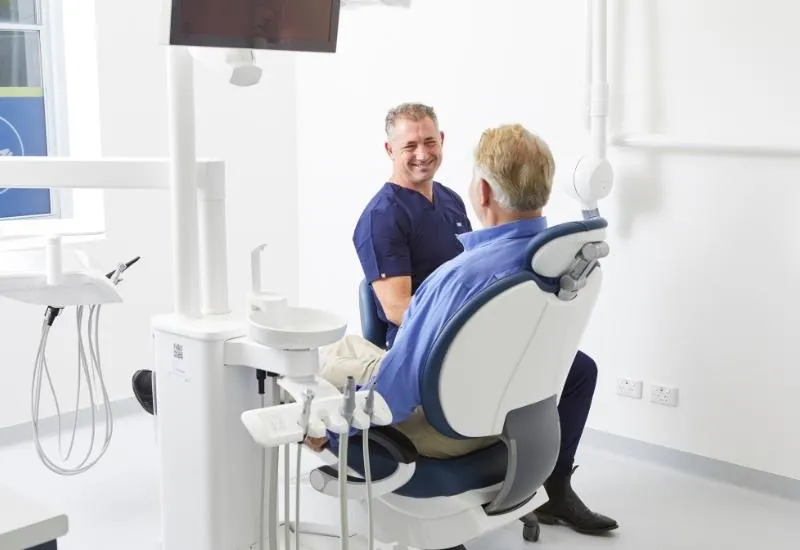
If you’re missing teeth, especially at the back of your mouth where they cannot be seen, you may think you’ll be fine to simply carry out without them…
But think again.
There are more than just cosmetic reasons to consider when looking at options to replace missing teeth. Teeth are made to work together — and when one or a few teeth are lost, serious implications can follow.
Missing teeth can have a major impact on your life. And it’s not just the biological impact on the way you eat and speak that we’re concerned about. Missing teeth can also have a deeply detrimental effect on your mental health and social life.
As we said above, teeth work together. So when a tooth is lost, it can throw the whole mouth and jaw out of whack. Some biological implications of missing teeth include:
Missing teeth can affect how you speak. Your teeth, lips and tongue all work together to correctly form and pronounce words. So, when a tooth is lost (especially at the front of the mouth), your verbal ability may suffer.
It may become difficult or uncomfortable to chew your food. Not only does this limit your food choices, but it can also lead you to only chew on one side of your mouth to compensate for your lost tooth. Over time, this will affect your jaw muscles. Plus, studies have found that poor chewing ability is linked to poorer general health. Some believe this is because your chewing ability impacts your diet, which in turn impacts your overall health.
When a tooth is lost, the gap left behind allows the remaining teeth to shift out of their correct position. This can change your bite alignment and lead to numerous other issues such as tooth sensitivity and tooth grinding. Bite misalignment can also make it harder to keep your teeth clean, leaving you at a higher risk of tooth decay and gum disease.
When missing teeth are not replaced, your jaw bone will gradually recede. This is because the jaw bone requires stimulation from a tooth or dental implant to maintain its density. Jaw bone loss will not only reduce your tooth replacement options in future, but it can also affect your facial structure.
The changes in your bite and how you chew your food have a domino effect on your jaw and facial muscles. Not only that, but jaw bone loss from missing teeth can cause your lips and cheeks to sink inwards, making you look older. Over time, this will change the shape and structure of your face.

Missing teeth can have a devastating effect on your psychological and emotional state.
If you have teeth missing, you may be dealing with negative emotions such as:
The psychological impact of missing teeth often has a flow-on effect into your social life and you may:
Sadly, the emotional and social toll of missing teeth isn’t talked about as much as it should be. Many dentists will openly discuss the physical impairments of missing teeth with their patients, yet avoid discussing the psychological implications.
This can cause many patients to feel alone in their struggle or as though they can’t talk about their situation out of fear of being judged or shamed. Often, this is a big reason why they put off seeing their dentist and avoid getting treatment — it can become a vicious cycle that’s tough to break.
That’s why we want to put an end to patients feeling anxious or embarrassed about getting the care they need. Dental Implants on Miller is a 100% judgement-free zone. Trust us, we’ve seen (and treated) it all before. We’re not here to lecture or scold. Our only aim is to get you on your way to a healthy and whole smile.
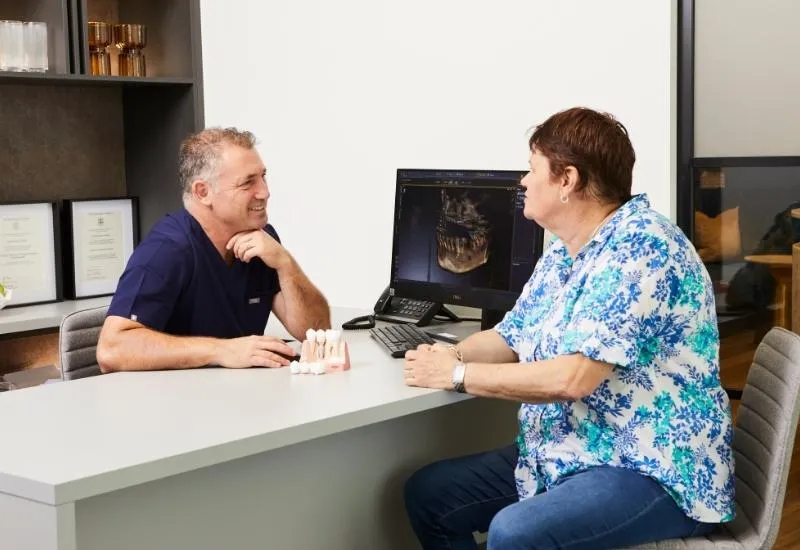
Fortunately, there are a number of options to replace missing teeth. And the right one for you will ultimately depend on how many teeth you have missing, their location in your mouth and whether you require additional treatments.
While there are some less expensive interim tooth replacement options available, like dentures, these do have their own set of biological implications you need to consider (which we’ve outlined below).
Long-term solutions, like dental implants or All-on-4, are always going to be the best option for restoring your smile and your quality of life. Dental implants not only provide a more durable, permanent fix, but they’re also the closest replacement possible to natural teeth.
A dental implant is a titanium post that is surgically implanted into the jaw to replace the missing tooth root. The implant is then capped with an abutment and a dental crown (also called an implant tooth) to fill the gap left by the missing tooth. Over time, the dental implant fuses with the jaw bone (called osseointegration), helping to secure the implant in place.
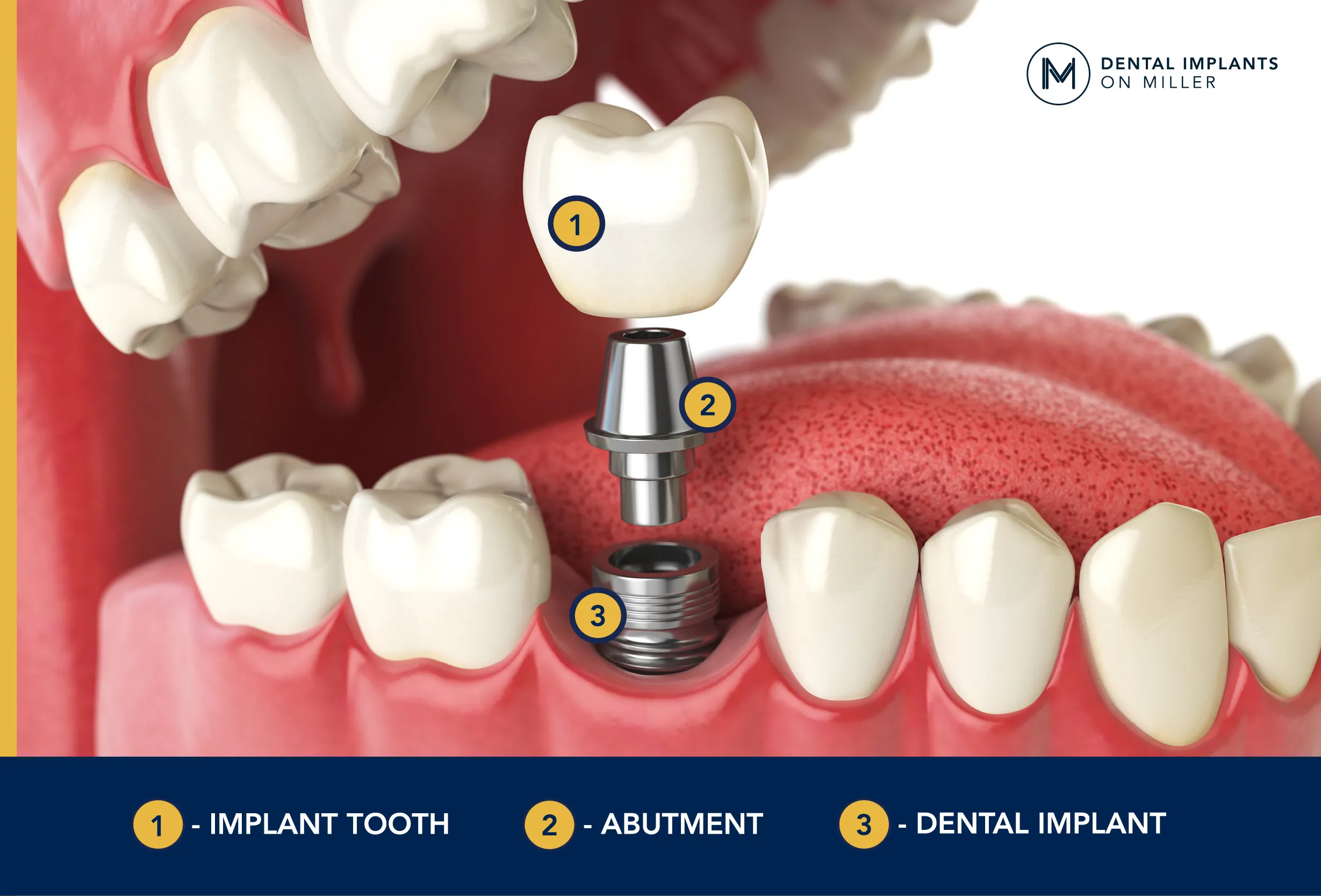
Patients who have lost a single tooth or several teeth in different locations in the mouth.
At Dental Implants on Miller, single dental implants start from $6,000.
Want to learn all about the factors that affect the cost of dental implants? We break it down for you in this article.
A dental implant bridge involves the placement of at least two implants into the jaw to hold an implant bridge (or tooth bridge) of several teeth in a row in place.
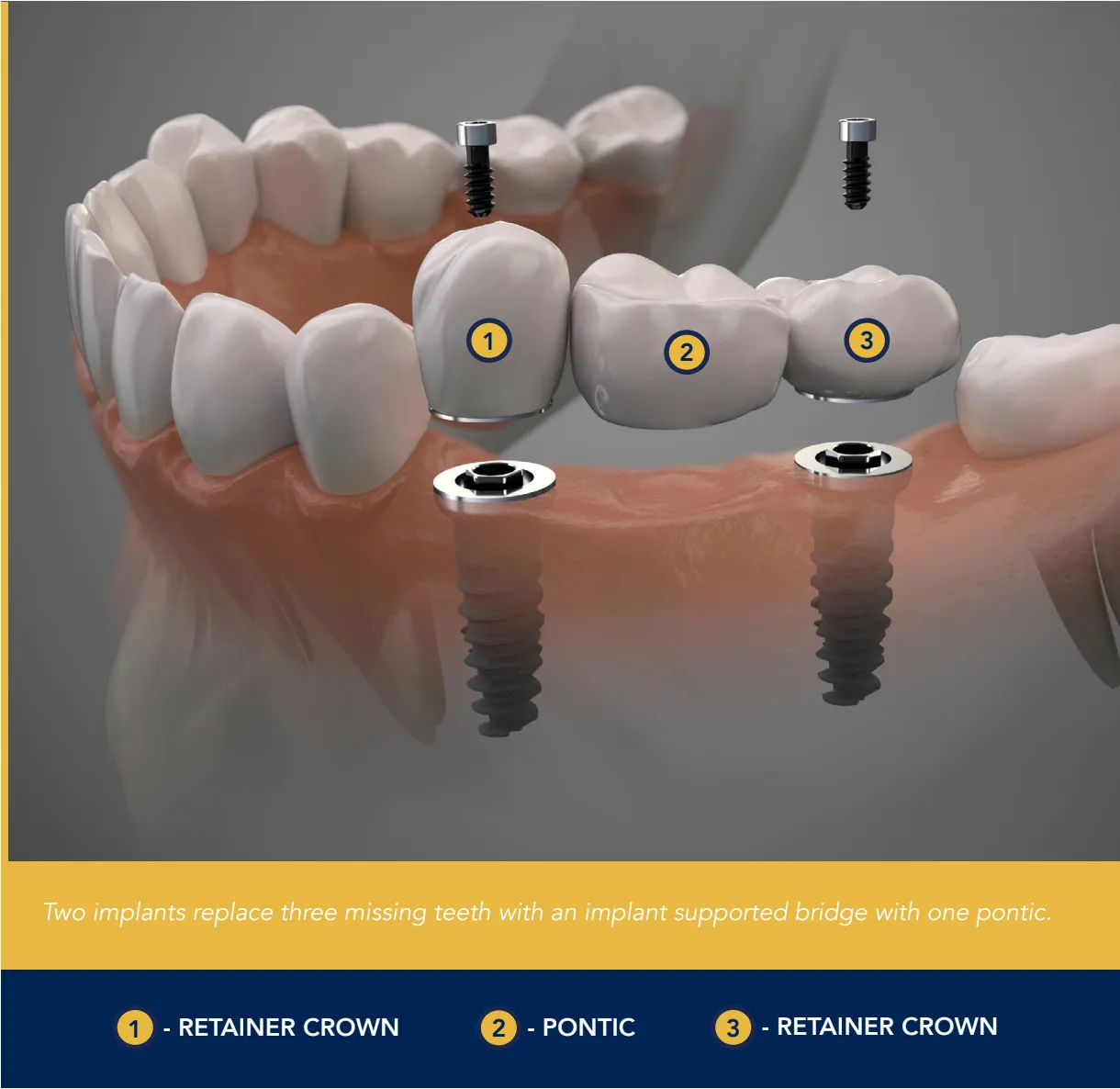
Patients who are missing several teeth in a row.
At Dental Implants on Miller, a dental implant bridge starts from $14,500.
All-on-4 involves the placement of (at least) four titanium implants in the jaw to hold a permanently fixed tooth bridge of up to 12 teeth in place. Thanks to the special All-on-4 technique, this treatment rarely requires bone grafting — even if you have bone loss. Some may refer to All-on-4 as full mouth dental implants as it is used to replace all teeth in the upper or lower jaw.
If you’d like to learn more about the All-on-4 treatment, be sure to check out this article.
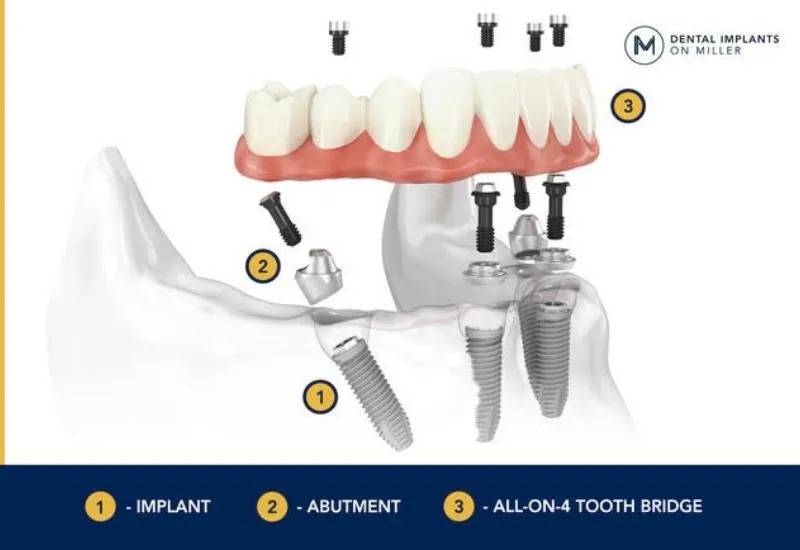
Patients who have no teeth or are about to lose all of their teeth in their upper or lower jaw (or both)
At our Sydney All-on-4 clinic, packages for All-on-4 start from $19,500.
Did you know there are a few factors that can influence the cost of your All-on-4 treatment? Read all about them here.
Dental Implants on Miller is recognised as an All-on-4 Centre of Excellence by Nobel Biocare.

As an All-on-4 Centre of Excellence, we have the surgical experience and training required to offer the genuine All-on-4 treatment concept. This means you’ll receive treatment from a trusted dental practice, vetted by Nobel Biocare. Plus, it assures that you’re receiving authentic Nobel Biocare implants and components, backed by a lifetime warranty.

Removable dentures offer a cheaper, short-term solution for missing teeth. Dentures consist of replacement teeth attached to a gum-coloured base that is moulded to fit your mouth. If you need to replace all of your teeth, full dentures (or complete dentures) would be used. If you only need to replace one or a few teeth, a partial denture may be used.
We do not offer dentures at Dental Implants on Miller.

Patients who are seeking a lower cost, short-term option for their missing teeth
There’s really no need to worry. At Dental Implants on Miller, we offer a range of flexible finance options so you can restore your smile now and pay in manageable instalments.

If you’re ready to replace the missing piece in your smile, book your free consultation online and come in for your obligation-free chat with Dr Daniel Adamo. You’ll get the chance to discuss the right tooth replacement options for you and walk out with a personalised treatment plan.